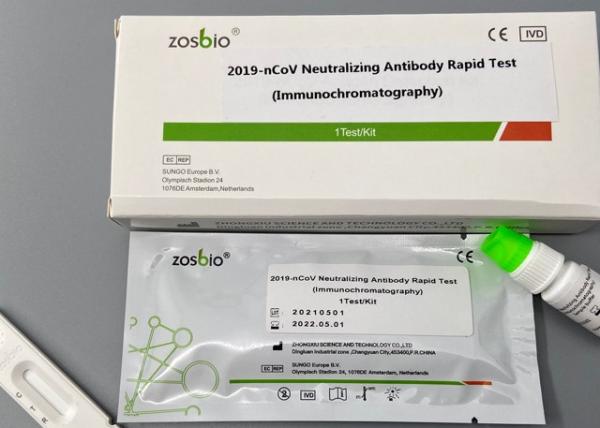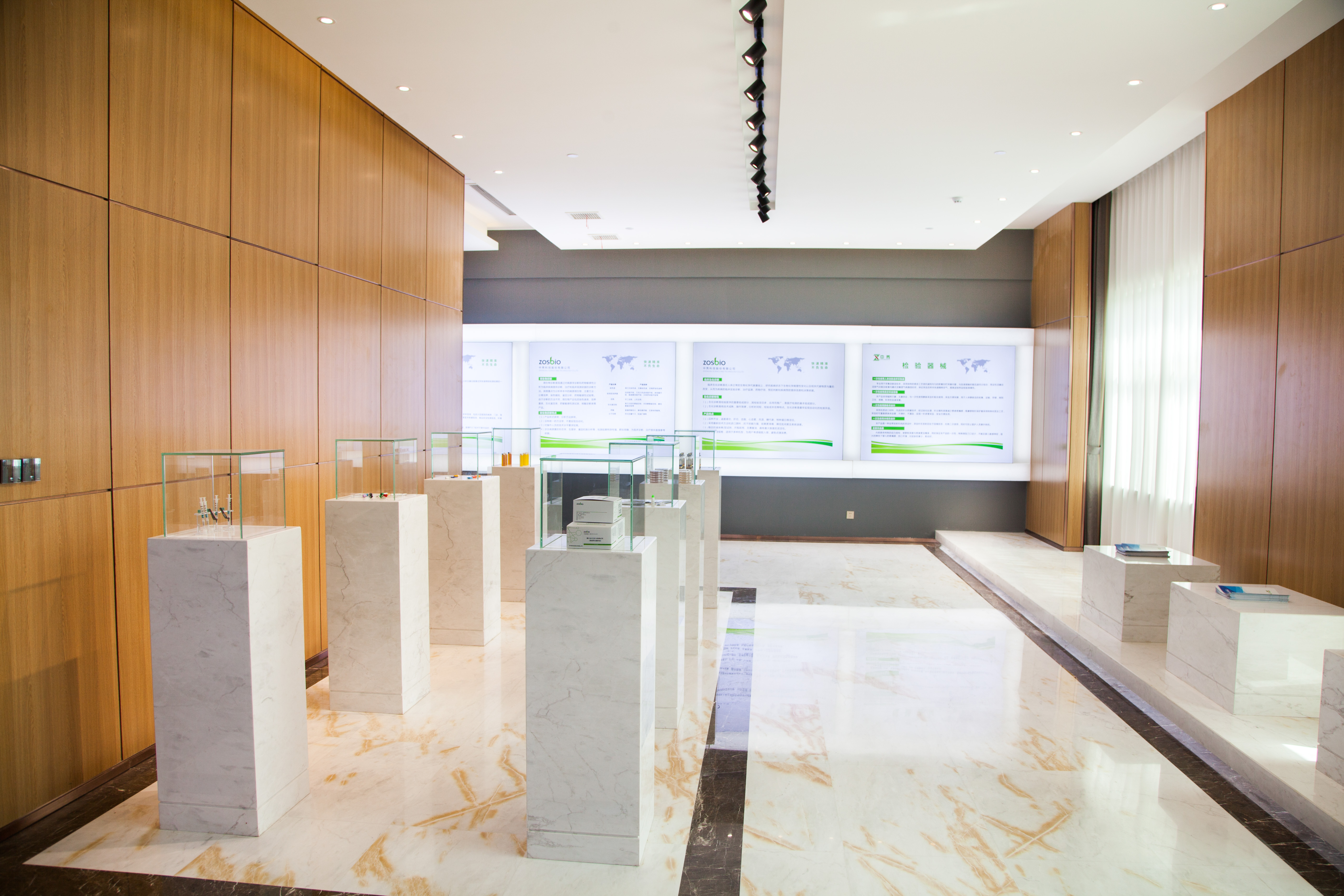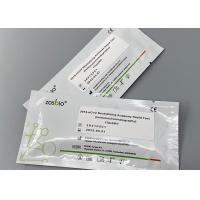2-30 ℃ for 12 months.
The validity period of aluminum foil is 1 hour after opening.
Configuration number: see label for details.
Deadline: please refer to the label for details.
Sample Requirements
1. Collect serum, plasma or whole blood samples.
2. Precipitates and floats in the sample affect the experimental
results and must be removed by centrifugation.
3. Anticoagulants: Jellyfish skin, EDTA, sodium citrate The use of
anticoagulants has little effect.
4. Blood sampling should be done by a medical professional. Serum /
plasma testing is the first choice. In case of emergency or special
circumstances, the patient's whole blood sample can be used for
rapid examination.
5. The storage time of serum and plasma samples should not exceed 8
hours at room temperature. It can be stored in 2 ° C ~ 8 ° C 6
months, 5 days or less, ~ 20 ° C, but repeated freeze-thaw cycles
should be avoided. Freezing time of whole blood sample should not
be less than 48 hours ℃ -8 ℃.
Test Method
Please read the guide carefully before the exam. Please lower all
tested drugs to room temperature before testing. The test shall be
conducted at room temperature.
1. Remove the test card from the packaged test bag and use it
within 1 hour.
2. 20 μ Add l sample (serum, plasma or whole blood) into the
filling hole of the test card, and then drop 2 drops (about 60
drops) μ l) Add sample buffer and start timing.
3. The reaction time was 10-15 minutes at room temperature. The
result was invalid after 20 minutes.
Interpretation of Test Results

Result judgment chart of test card:
1. Invalid results: the quality management line (C line) has no
response line, the test is invalid, and the experiment needs to be
carried out again.
2. Negative results: the detection line (t line) appeared red band,
and its color rendering was higher than that of control line (r
line), quality management line (C line) and control line (r line).
3. Positive results: the test line (t line) had no red band, or the
test line (t line) had red band, but the color development was
lower than that of the control line (r line), and the quality was
decreased. Control line (C line) and control line (r line).
Limitation of Test Method
This element is only used for in vitro diagnosis.
2. In order to test, it is necessary to add an appropriate amount
of sample. Too many or too few samples will lead to incorrect
results.
3. Hemolysis, blood lipid, jaundice and contaminated samples may
affect the test results and should be avoided.
4. Reagent test results are only for clinical reference, can not be
used as the only basis for clinical diagnosis and treatment. The
final diagnosis of the disease must be based on a comprehensive
evaluation of all clinical and laboratory results.
Product Performance Indicators
1. Specificity analysis
1.1 cross reaction: the following types of antibody evaluation were
conducted for interference with reagents, and no cross reaction
occurred.
| SN | Item | Cross reaction | SN | Item | Cross reaction |
| 1 | Endemic human coronavirus OC43 | No | 10 | Enterovirus | No |
| 2 | Endemic human coronavirus HKUI | No | 11 | EB virus | No |
| 3 | Endemic human coronavirus NL63 | No | 12 | Measles virus | No |
| 4 | Endemic human coronavirus 229E | No | 13 | Human cytomegalovirus | No |
| 5 | Influenza A virus | No | 14 | Rotavirus | No |
| 6 | Influenza B virus | No | 15 | Norovirus | No |
| 7 | Respiratory syncytial virus | No | 16 | Mumps virus | No |
| 8 | Adenovirus | No | 17 | Varicella-zoster virus | No |
| 9 | Rhinovirus | No | 18 | Mycoplasma pneumoniae | No |
1.2 interfering substances: in New Coronavirus (2019 ncov)
neutralizing antibody test items, the potential interference of the
following substances is assessed by adding the following substances
in a specific concentration sample. The results show that all kinds
of interfering substances will not interfere with the detection
results of reagents.
| Interfering substances | Concentration | Interfering substances | Concentration |
| Bilirubin | ≤50mg/dL | Triglycerides | ≤15mmol/mL |
| Hemoglobin | ≤5g/L | Cholesterol L | ≤500mg/d |
| Rheumatoid factor | ≤500IU/mL | Human total IgG | ≤14mg/mL |
| Ribavirin | 0.4mg/mL | Fluticasone | 0.5mg/mL |
| Oxymetazoline | 10mg/mL | Dexamethasone | 5 mg/mL |
| Histamine hydrochloride | 10mg/mL | Triamcinolone acetonide | 5mg /mL |
| Tobramycin | 1mg/mL | Levofloxacin | 0.2 mg/mL |
| Oseltamivir | 1mg/mL | Azithromycin | 0.1 mg/mL |
| Zanamivir | 1mg/mL | Ceftriaxone | 0.4 mg/mL |
| Arbidol | 0.5mg/mL | Meropenem | 0.2 mg/mL |
2.Clinical study: 120% positive and 300 negative samples were
selected from Novell coronavirus (2019 nCoV) IgG test reagents
(colloidal gold method) as controls. The results are summarized
below.
| 2019-nCoV IgG Ab detection reagent (colloidal goldmethod) |
Sum |
| Positive | Negative |

| Positive | 115 | 5 | 120 |
| Negtive | 5 | 295 | 300 |
| Sum | 120 | 300 | 420 |
| Sensitivity | 95.83%, (95%CI: 90.62%~98.21%) |
| Specificity | 98.33%, (95%CI: 96.16%~99.29%) |
Precautions
1. This product is used only for in vitro diagnosis.
This product cannot be used after it is thrown away.
3. Before you start, read the operating guide carefully and follow
the reagent guide to perform the experiment.
4. Do not conduct experiments in harsh environments such as
disinfectants, sodium hypochlorite, acid-base, acetaldehyde, other
corrosive gases, and dusty environments. After the experiment, it
must be disinfected in the laboratory.
5. All samples and reagents used are considered potentially
contagious substances and should be destroyed according to local
regulations.
6. Reagents must be used within the shelf life marked on the outer
package. Use the induction card as soon as possible to remove it
from the aluminum foil bag and prevent moisture.
Company profile
Zhongxiu Science And Technology Co.,Ltd., is a high-tech enterprise
engaged in the research and development, production and operation
of in vitro diagnostic products. The in vitro diagnostic products
developed by the company cover POCT series, microbial series,
biochemical series and immune series reagents and supporting
instruments.
The company has always adhered to the core concept of "fast and
accurate, living up to life", committed to providing society with
excellent products and services, and contributing to the cause of
human health.













